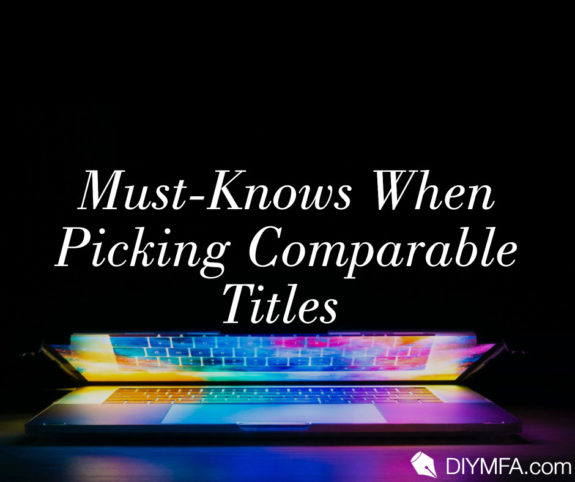Do you have trouble finding comparable titles for your book? Are you confused about how to use comparable titles in general? Or understand what they are?
Comparable titles (also known as comps) can be extremely helpful when writing and pitching your book to a literary agent or editor.
They are also a huge way to ensure your book is marketed in the right place on Amazon or in the bookstore—and better yet, they’re good practice to learn how to read with a purpose.
Finding bad comps for your books is worse than no comps.
To avoid this, I’d like to share five must-knows to picking your comps, as well as a better idea about what makes a comp and how to use it in a pitch.
Why Comparable Titles Are Important (But Not Mandatory)
When I worked as an editorial intern at P.S. Literary Agency, finding comps was an important task. Comps could help the agent I reported to decide if a book was worth representing. It could also strengthen a pitch for a client’s new book to an editor.
Comparable titles, or books/stories that have certain similarities to another story, can be extremely useful when convincing an editor or agent that a story is worth investing in. It hints at certain story preferences and tastes, and identifies with what has worked in the market before.
Plus, it attracts an ideal readership!
In the first months of my role, finding comps was a challenging task.
While businesses like Amazon make the research easier (Amazon, in fact, first gained success because of their brilliant move to recommend additional books a customer would like after purchasing a title), there are certain details I needed to keep in mind in order to find a good comp.
I mentioned above that finding bad comps is worse than no comps. And the agent I worked for told me multiple times that comps weren’t mandatory in a query letter, although when good ones came along, they helped.
You see, there’s a trick to finding good comps—if you know what good means.
I’d like to clarify this with five must-knows covered in this post.
Must-Knows When Picking Your Book’s Comparable Titles
There’s a lot of great places to look for comps for your manuscript.
Libraries are the underdogs of all story archives, and I’m always a huge advocate for local bookstores, especially since booksellers really know their titles, and will have loads of recommendations when you describe what you’re looking for in a book.
Keep in mind, comparable titles aren’t exactly like the book you’re writing (if it was, then why are you writing a book that’s already been done?), but they are similar (and different).
For instance, you might be looking to make a connection with your story that an agent mentions they like on their #MSWL (manuscript wish list).
Take for example a story that could be described as smart fiction that involves a startup business in today’s society. A good comp for this might be Doree Shafrir’s Startup: A Novel.
Or maybe you’re looking for a book that takes a hard look at Islamophobia in American for young adults. Samira Ahmed’s Love, Hate, and Other Filters would be a fantastic fit.
How about nonfiction? Perhaps you want a comparable title that explores female entrepreneurs and the gender gap in business. I’d highly recommend Sophia Amoruso’s #Girlboss, which I suggested as a comp for Susanne Althoff’s amazing book Launching While Female.
All of these examples are good picks for the scenarios paired with them, but pulling these titless out at libraries, bookstores, Amazon, or Goodreads might seem overwhelming. At first.
To ensure you find a good title for your story’s comps, turn to one of the four story providers above, and then use these five must-knows to make sure they’ll work.
Note: While I linked to Amazon above, because Amazon is easiest for research, I deeply encourage you to consider buying local, if it’s in your means. I don’t always buy local, but if I can I do because bookstores and booksellers are awesome, and seriously worth talking to about stories.
I also thought you might enjoy this resource, which I’m passing along from Oprah’s magazine (I first saw it on Jodi Picoult’s social media), as it can help you locate and support black-owned bookstores: FIND THAT RESOURCE HERE.
Recently Published
Agents and editors need comps that have been recently published, or published within the last three (maybe five) years.
Why?
Because they need to know that your book will sell in today’s market, and if there’s a good comp that has done this, they will probably have more success when using it in their pitch to an editor or publisher.
However, there is an exception here. If you have two comps and one is older, or a TV show or movie, and the other is more recently published, it will work.
Just make sure at least one of the comps you pitch has been published in that last one to five year mark.
Published by the Big Five
This one is important, and what tripped me up most in my earlier months as an editorial intern.
The Big Five are considered the largest five publishers in the publishing industry, and the agent I worked most closely with emphasized the importance of pitching comps published by the Big Five when pitching a debut author’s book.
To check if your comp is from a Big Five publisher—and not a small publisher or indie publisher (or self published)—Jane Friedman created this phenomenal infographic.
Another good place to cross your t’s is from almossawi.com. It’s amazing. Bookmark this page in your browser. Or print it out and pin it to your wall: Big Five Infographic.
Performed Well in Sales
A good comp isn’t good unless it’s performed well in sales. Remember, comps are used to prove to an editor or publisher (or agent) that your book has what it takes to attract and please readers. Sales are evidence of this.
Of course, you’re probably not going to find a spreadsheet of a title’s finances online.
But you can discover if a book has done well by turning to best-seller lists, awards, options, and news about the book’s performance.
Not Ubiquitous
Another important must-know that you might not think about!
This is also the number one reason why nobody should use a book like Harry Potter and the Sorcerer’s Stone (or any Harry Potters) as a comp.
Just don’t do it.
Of course everyone wants to be as successful as J.K. Rowling’s series, but Harry Potter has really become something more than a book. It’s a brand.
And when books are ubiquitous, they don’t work well to pitch as a comp because there’s really no guarantee that any new title will reach that level of success.
Although we can hope!
(Some other example not to use, although great masterworks for you to read and analyze: Eat, Pray, Love, Gone Girl, The Lord of the Rings, The Chronicles of Narnia—I’m sure there are others, but these for sure, in addition to the fact that they’re not recently published (see must-know number one).)
Clear Aspect on Back Cover That is Similar to Your Story
Last on the list is the number one detail you should include in your query letter when pitching to an agent.
What do I mean by a clear aspect on the back cover that is similar to your book? This is the similarity that makes your book the same but different to your comp.
I mentioned a few of these examples with the books aforementioned: Startup, Love, Hate, and Other FIlters, and #Girlboss.
Where (and How) to Use Your Comparable Titles
Once you do find a good comparable title for your story, it’s important to understand where and how to use them.
If your heart is set on the traditional publishing route, the perfect place to pitch one or two of your comps is in the first paragraph of your query letter.
Here, look for what the literary agent your querying is interested in representing (research their manuscript wish list or interviews), and then identify the aspect (must-know number five) that they mention.
Not only will your comps work as a fantastic way to personally connect with the agent you hope will represent you and your work, but it shows you understand the market, your story, and how to research.
All major pluses in future clients!
If you’re not hoping to traditionally publish, comparable titles are still great ways to find your ideal readers and write your back cover.
We all have select tastes when it comes to stories, and knowing how to find comps will help you find your groups.
Why Good Comps Will Help You Read With a Purpose
As a fellow word nerd, you know that DIY MFA is all about reading with a purpose. And for good reason!
If you can’t read with a purpose, you won’t become a better writer. Writers have to read in order to strengthen their craft, voice, understanding of story structure, and style.
Writers also need to understand why a story works—or as I like to define this, advances the plot and develops characters with meaning. In addition to providing exceptional, unique settings, prose, and messages.
When you find a comparable title that works for your book, you should read it. Then, using your writing craft knowledge, start to decipher what makes your story the same but different.
Hopefully you’ll pick up a few tricks to make your writing better along the way—without repeating the exact same ideas of other authors, of course.
If you want to become a better writer, learn how to read like one.
Do this by finding comparable titles that work.
Thank You to DIY MFA, and a Bittersweet Farewell (for Now!)
For the past three and a half years I’ve had the great privilege to write as a columnist for DIY MFA.
I first met and was inspired by Gabriela Pereira in 2015 at a Writer’s Digest Conference in New York City, connecting after a seminar she gave on characters.
Enlightened, I started to follow her career, and later came across an opportunity to pitch a column for the reading portion of DIY MFA’s pillars, which became my Let’s Talk Books series.
Because of DIY MFA, I have grown as a writer, reader, educator, and advocator for stories in immeasurable ways.
I have cherished my time with you fellow word nerds and the DIY MFA team, and am sad to write this farewell post (for now!), but am excited to focus on my burgeoning editing and storytelling career and growing family.
As an editor and writer myself, I cannot encourage you enough to support the DIY MFA team. They are fun. They are smart. And they are supportive. (Not to mention nerdy!)
I hope that you have benefited from this final, farewell post—and hopefully all the posts I contributed over the years.
I wish you well, and happy, purposeful reading.

Abigail K. Perry is a Certified Story Grid Editor with professional teaching, literary agency, and film production experience. In addition to writing masterwork guides that help people learn how to write, read, and edit like a writer, she works as a freelance developmental editor/book coach and diagnostic editor. Abigail also teaches Genre-Focused writing workshops for the genres she specializes in, which include Women’s Fiction, YA Fantasy, Upmarket Fiction, Historical Fiction, and Scripts. Visit Abigail’s website if you’re a writer looking for an editor who will help you grow as storyteller, and who has experience in differentiated instruction, traditional publishing, and film.







